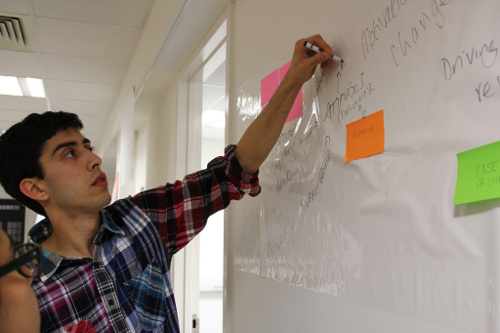Subscribe to our newsletter
#FoundersFriday with Dominic Falcao from Deep Science Ventures
Deep Science Ventures (DSV) is a programme, environment, and community to support scientists and engineers to start their own companies – regardless of whether they have a team or an idea.
To become part of DSV you don’t need an idea, is DSV a kind of supercharged recruitment consultancy? Or are you looking to grab hold of brilliant people and then assist them in becoming entrepreneurs?
Unequivocally: this is not a consultancy – we want to create founders. Participants in DSV have to think for themselves, take on huge problems with no clear solutions, and build businesses that they themselves want to own and run. It is about finding something you care about; an area you are well-positioned to add value to, and then carrying out the steps needed to get there.
Edible packaging! Wearable ski instructors! All great ideas – what type of project excites you?
We typically don’t go for web tech, or for technology looking for a problem (rather than the other way around). At DSV, we love it when people begin by focusing on genuine problems.
Attacking issues by recombining existing technologies, taking a unique perspective, is a highly creative and effective way of generating protectable inventive steps . This process naturally occurs in a small minority of cases in the world; our aim is to create an environment in which the highest possible occurrence of this sort of idea occurs.
What were you doing before Deep Science Ventures?
I ran Imperial Create Lab at Imperial Innovations, and at the same time, my co-founder, Mark Hammond, was overseeing Imperial Create Lab, as well as spinning out academic technologies. My day-to-day activities consisted of talking to early career scientists and engineers and helping them work through the ideas they’d had. What became painfully obvious was that brilliant people are not predisposed to having the best ideas. Sometimes, people who will go on to make terrible founders, have great ideas. Moreover, the majority of the smartest people in a university or a company who want to start something never really have that ‘big idea’; they move into industry, take up a post-doc position, or even start another degree as a result of a lack of direction. In other words, judging by ideas has both high false positives and false negatives – it’s a really poor filter. And yet, the world persists to decide who to support based on the idea they have. We thought: isn’t there something that takes great potential founders and increases the chances of them developing a set of ideas by controlling the other inputs: the people, the process, the facilities, and the challenges?
Are two – or many – heads better than one?
The most common reason people apply to DSV is to be in a place where people are as driven and as talented as they are! They want to be with like-minded individuals who are focused on creating a direct impact on the world.
What is your advice for young tech start-ups?
Think about your idea as a set of hypotheses and then set about devising careful tests to prove or disprove those hypotheses.
As the founder of a business, what are you most proud of? What does the future have in store for DSV?
We’ve been full time for eight weeks and have just closed a round of applications – several hundred people, the majority of them holding PhDs, and 99% of them from science, engineering or medical backgrounds, have applied. What’s more, all candidates are from the EU’s top universities! This demonstrates a strong desire from talented individuals to be part of the type of atmosphere that we’re creating at DSV. We want to develop world-beating facilities and an environment where ground-breaking, commercial technologies are born. To then continue to support early career researchers from all over the world for as long as they require is a fundamental goal of ours!
Find out more about Deep Science Ventures




